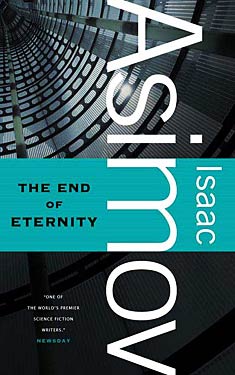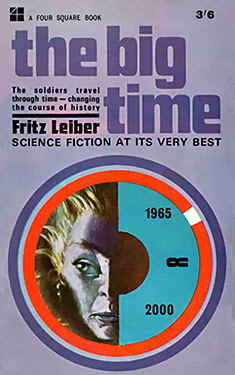Grand Master Reading Challenge November Review Poll Winner: Daniel Roy
![]() The November GMRC Review Poll is over and our winner is Daniel Roy (triseult) for his review of Ursula K. Le Guin’s classic The Dispossessed. Congrats to Daniel for his second win – the first was for September – and many thanks for all the great reviews he has contributed to the site – 57 and counting!
The November GMRC Review Poll is over and our winner is Daniel Roy (triseult) for his review of Ursula K. Le Guin’s classic The Dispossessed. Congrats to Daniel for his second win – the first was for September – and many thanks for all the great reviews he has contributed to the site – 57 and counting!
For his efforts, Daniel has won a GMRC T-shirt, a GMRC button and a set of commemorative WWEnd Hugo Award bookmarks as well as his choice of book from the WWEnd bookshelf. All runners-up will receive a button and a set of bookmarks.
As of now our 172 participants have logged 707 books read (up from 662 last month!) and have posted 218 reviews which is another big jump from last month. We’ve noticed several more people have completed the challenge, including yours truly, and there are a several more on the cusp with just one book to go. Thanks to everyone for your participation and best of luck completing your challenge! We’re in the home stretch now.
Of course, since 2012 and the GMRC are winding down, it’s time to get ready for next year’s challenge. We’ll be announcing the details for 2013 next week. We hope you’ll all be back again, it’s going to be awesome.
GMRC Review: The End of Eternity by Isaac Asimov
 Scott Lazerus came to Worlds Without End looking for a good list of books. He found David Pringle’s Best 100 Science Fiction Novels to his liking and is currently working his way through the list. He has posted a bunch of reviews for WWEnd including several for the GMRC. Be sure to check out Scott’s excellent blog series Forays into Fantasy too!
Scott Lazerus came to Worlds Without End looking for a good list of books. He found David Pringle’s Best 100 Science Fiction Novels to his liking and is currently working his way through the list. He has posted a bunch of reviews for WWEnd including several for the GMRC. Be sure to check out Scott’s excellent blog series Forays into Fantasy too!
When I started reading science fiction, Heinlein, Asimov, and Clarke were the “big three” SF writers—already thought of as the authors of classics while they were still alive and writing. Of the three, Asimov was the favorite of my youth. I appreciated his rigorous logic, humanism, and devotion to the idea that human rationality and science would continue to move us forward into a challenging but ultimately triumphant future. Having not read his work for decades, I looked forward to reacquainting myself with Asimov, but with some trepidation, since it seems that the “Good Doctor” has lost some of his critical luster over the years, and it’s true that sometimes the favorites of adolescence are best left to remain as pleasant memories. David Pringle included The End of Eternity (1955) in his 100 Best, but only grudgingly: “He is one of the best-known sf writers in the world, so I felt I had to include something by Isaac Asimov, though I confess I have little enthusiasm for his work.” His essay on the novel certainly reflects that lack of enthusiasm.
Returning to the novel, the source of the difficulty with Asimov quickly became clear. Asimov, possibly more than any other author, embodies a common dichotomy in Golden Age science fiction: the focus is on ideas and plot, while characterization and prose style often do not hold up to the standards that modern genre readers expect. Asimov was open about the fact that his prose was purely functional and transparent—its job was to present the story without in itself being noticeable. For young readers, this may be especially appealing, but the success of the stories rides on the mind-blowing concepts and/or engaging plots on which Asimov’s fictions succeeds or fails. Readers looking for complex characterization or vivid descriptive writing will have to look elsewhere. But for anyone tolerant of such failings, or willing to overlook them in the interest of a good story, The End of Eternity still holds up as one of the great time travel novels, a nice blend of science fiction and mystery (a strength of Asimov’s), and a fine example of the author’s humanistic themes.
2012 Damon Knight Memorial Grand Master Awarded to Gene Wolfe
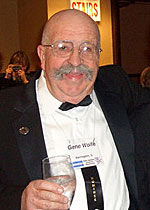 In news that will surprise absolutely no one on the planet, the Science Fiction & Fantasy Writers of America have named the legendary Gene Wolfe as their 2012 Damon Knight Memorial Grand Master.
In news that will surprise absolutely no one on the planet, the Science Fiction & Fantasy Writers of America have named the legendary Gene Wolfe as their 2012 Damon Knight Memorial Grand Master.
The award is given, more or less annually, for contributions to the literature of Science Fiction and Fantasy. Check out the official press release for some nice comments from last year’s recipient, Connie Willis, and others.
If you’re a participant in WWEnd’s 2012 Grand Master Reading Challenge you can add Mr. Wolfe to your challenge list if you’ve read him this year. If you’re a fast reader you have a couple weeks to get him in under the wire!
Our congratulations to Gene Wolfe!
WWEnd Grand Master Reading Challenge: November Review Poll
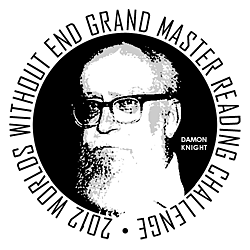 This is the penultimate GMRC review poll! For November we featured 6 GMRC reviews in the blog and it’s time again to cast your vote for the best.
This is the penultimate GMRC review poll! For November we featured 6 GMRC reviews in the blog and it’s time again to cast your vote for the best.
Remember, you don’t have to be a GMRC participant to vote and the poll will remain open until December 15th so you have plenty of time to read any reviews you missed.
- The Day After Tomorrow by Robert A. Heinlein – Carl V.
- The Listeners by James E. Gunn – valashain
- Make Room! Make Room! by Harry Harrison – galleyangel
- Ensign Flandry by Poul Anderson – Carl V.
- The Dispossessed by Ursula K. Le Guin – triseult
- The Big Time by Fritz Leiber – Allie
Winner gets the following:
- GMRC T-shirt – your choice of colors so long as it’s black
- GMRC button – you can never have too much flair
- Set of WWEnd Hugo Award bookmarks guaranteed to hold your place in any paper book.
- Book of your choice from the WWEnd bookshelf – winner gets a list of titles to pick from
- Everlasting Glory – So you’ll have that goin’ for ya. Which is nice.
Runners up will get a GMRC button and a set of bookmarks. Thanks to all our reviewers and good luck!
And back, by popular demand, is RhondaK101 with the latest stats.
Authors with the most books read:
- Isaac Asimov (54)
- Robert A. Heinlein (51)
- Arthur C. Clarke (45)
- Joe Haldeman (43)
Authors with the most different titles read:
- Robert A. Heinlein (19)
- Robert Silverberg (18)
- Isaac Asimov (16)
- Poul Anderson (15)
Books most frequently read:
- Joe Haldeman – The Forever War (25)
- Alfred Bester – The Stars My Destination (22)
- Frederik Pohl – Gateway (17)
- Ray Bradbury – Fahrenheit 451 (17)
- Philip José Farmer – To Your Scattered Bodies Go (15)
GMRC Review: The Big Time by Fritz Leiber
 Guest Blogger, Allie McCarn, reviews science fiction and fantasy books on her blog Tethyan Books. She has contributed many great book reviews to WWEnd including several Grand Master reviews featured in our blog.
Guest Blogger, Allie McCarn, reviews science fiction and fantasy books on her blog Tethyan Books. She has contributed many great book reviews to WWEnd including several Grand Master reviews featured in our blog.
The Big Time by Fritz Leiber
Published: Galaxy Science Fiction, 1957
Awards Won: Hugo Award
The Book:
“Have you ever worried about your memory, because it doesn’t seem to recall exactly the same past from one day to the next? Have you ever thought that the whole universe might be a crazy, mixed-up dream? If you have, then you’ve had hints of the Change War.
It’s been going on for a billion years and it will last another billion or so. Up and down the timeline, the two sides–“Spiders” and “Snakes”–battle endlessly to change the future and the past. Our lives, our memories, are their battleground. And in the midst of the war is the Place, outside space and time, where Greta Forzane and the other Entertainers provide solace and r-&-r for tired time warriors.” ~WWend.com
This is my second-to-last novel for WWEnd’s 2012 Grand Master Reading Challenge. Fritz Leiber was an author with a wide-ranging imagination, who applied his skill to many kinds of speculative fiction. He wrote a number of Hugo award-winning science fiction stories (including this one), but he was also the author of many acclaimed works in horror and fantasy. Last year, I reviewed his horror/urban fantasy novel Conjure Wife, which may soon get its 4th film adaptation. The styles of Conjure Wife and The Big Time are so different that they seem almost written by different people. I think that Conjure Wife was written more for wide appeal, which could be one of the reasons why it has been adapted to film so often. The Big Time, on the other hand, is a very unusual book, and one that I could see having a smaller audience through the years.
GMRC Review: The Dispossessed by Ursula K. Le Guin
 Daniel Roy (triseult), has contributed over 50 reviews to WWEnd including this, his fourth GMRC review to feature in the WWEnd blog. Daniel is living his dream of travelling the world and you can read about some of his adventures on his blog Mango Blue.
Daniel Roy (triseult), has contributed over 50 reviews to WWEnd including this, his fourth GMRC review to feature in the WWEnd blog. Daniel is living his dream of travelling the world and you can read about some of his adventures on his blog Mango Blue.
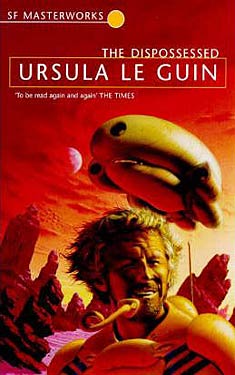 Calling this book “perfect” would do it an injustice. Its brilliance is not so much in meeting SF standards, but in exceeding them and leaving them far behind.
Calling this book “perfect” would do it an injustice. Its brilliance is not so much in meeting SF standards, but in exceeding them and leaving them far behind.
The Dispossessed is a complex novel. It’s not complex in terms of structure or themes; it’s not a hard book to read. Quite the opposite. But it manages to touch on so many aspects of the human experience at once that it’s hard to sum up what makes it so fascinating.
At the heart of it all is Shevek. Shevek, so complex and delightful to read. Shevek’s a hero, an outcast, a brilliant physicist, an idealist, an alien, a father, a lover, and a bit of a goof. He’s so many things at once that the only word to describe him is real. He anchors the whole story, brings it to life, fills it with emotion and thought. Through Shevek, Le Guin explores a plethora of themes: anarchism, politics, science, inspiration, love, responsibility, injustice, freedom. He’s the most realistic and inspirational fictional scientist I have ever read, and yet there is still time for him, in a mere 300 pages, to be a caring father and a poignant lover. Shevek’s awesome.
Some readers see in this book a plea for anarchism. I like the political theory, especially Noam Chomsky’s take on it, which he calls social libertarianism. By tackling anarchism, Ursula Le Guin is doing what SF should aspire to do every time: she explores a Great Idea, playing with it to see if it’s possible. In that sense, yes, she gives anarchism center stage, and gives it the space to make its plea. But I don’t think she set out to write a straight-up inspirational Utopia. Anarres doesn’t sound like such a great place to live.
 The utopia of The Dispossessed is Shevek, not Anarres. Anarres’ brand of anarchism is broken, bogged down by the usual power struggles and human pettiness. Anarres forgot that a revolution must continue, lest it becomes the new order. The real anarchist revolution of this story is Shevek. He is a stranger in his own home, and he exiles himself to another world to find it again. In so doing, he touches both worlds in unexpected ways–and far beyond.
The utopia of The Dispossessed is Shevek, not Anarres. Anarres’ brand of anarchism is broken, bogged down by the usual power struggles and human pettiness. Anarres forgot that a revolution must continue, lest it becomes the new order. The real anarchist revolution of this story is Shevek. He is a stranger in his own home, and he exiles himself to another world to find it again. In so doing, he touches both worlds in unexpected ways–and far beyond.
I can already see that this first read of The Dispossessed won’t be my last. This is SF of the first order, one that enriches my own world by its mere existence as a thought experiment. And besides, I have a feeling I’ll miss Shevek if we spend too much time apart.
GMRC Review: Ensign Flandry by Poul Anderson
 On his blog Stainless Steel Droppings blogger Carl V. Anderson reviews SF/F books and movies, conducts author interviews and even hosts his own reading challenge: The 2012 Science Fiction Experience. This is Carl’s sixth GMRC review to feature in our blog.
On his blog Stainless Steel Droppings blogger Carl V. Anderson reviews SF/F books and movies, conducts author interviews and even hosts his own reading challenge: The 2012 Science Fiction Experience. This is Carl’s sixth GMRC review to feature in our blog.
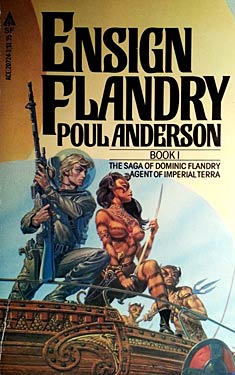 Poul Anderson is one of the authors I chose earlier this year as part of the Grand Master Reading Challenge hosted by Worlds Without End. Anderson was a prolific author whose career spanned many decades and consequently many eras of science fiction so I was unsure exactly where to start. I had toyed with the idea of starting with his Flandry series though the covers of the more recent collected editions tended to make me think these might be like the oversexed wish-fulfillment of Heinlein’s later years. I did not want that. When I saw this Michael Whelan cover for the first novel in the series my hopes rose and I decided to go ahead and snag the book for its cover, hoping that when I got around to reading it I would not be disappointed.
Poul Anderson is one of the authors I chose earlier this year as part of the Grand Master Reading Challenge hosted by Worlds Without End. Anderson was a prolific author whose career spanned many decades and consequently many eras of science fiction so I was unsure exactly where to start. I had toyed with the idea of starting with his Flandry series though the covers of the more recent collected editions tended to make me think these might be like the oversexed wish-fulfillment of Heinlein’s later years. I did not want that. When I saw this Michael Whelan cover for the first novel in the series my hopes rose and I decided to go ahead and snag the book for its cover, hoping that when I got around to reading it I would not be disappointed.
Guess what? I was not disappointed, not by a long shot.
My first foray into one of Poul Anderson’s created universes proved to be one filled with rip-roaring adventure, political intrigue, Bond-style romance and not a little bit of commentary on the soul-blackening compromise of world, or in this case Imperial, government. Ensign Flandry not only provided me with some of the everyman-hero-overcoming-all-odds storytelling I was hoping for but was also full of surprises.
GMRC Review: Make Room! Make Room! by Harry Harrison
 Glenn Hough (gallyangel) is, among other things, a nonpracticing futurist, an anime and manga otaku, a gourmet, a writer of science fiction novels which don’t get published to world wide acclaim, and is almost obsessive about finishing several of the lists tracked on WWEnd. This is Glenn’s third featured review for the GMRC.
Glenn Hough (gallyangel) is, among other things, a nonpracticing futurist, an anime and manga otaku, a gourmet, a writer of science fiction novels which don’t get published to world wide acclaim, and is almost obsessive about finishing several of the lists tracked on WWEnd. This is Glenn’s third featured review for the GMRC.
 Let’s just get this out of the way right now. (And if you don’t know, this was the novel which was the basis for the 70s era classic SF movie Soylent Green.)
Let’s just get this out of the way right now. (And if you don’t know, this was the novel which was the basis for the 70s era classic SF movie Soylent Green.)
It’s not people! Soylent is not people in the novel. The novel doesn’t even hint at that. Frankly, it would’ve made the thing more interesting.
Harry Harrison presents us with a novel of squaller. New York has 35 million people in it. Most are poor, underfed, on the welfare; everything is falling apart since there are no supplies left to fix anything. Electricity is spotty. When the main character gets called to his police job early because of pending water or food riots, they have to send someone physically to his apartment to get him. Technology is in retrograde. People are either overworked or unemployed. The black-market deals in the rarest of commodities: beef. Occasionally, someone captures a rat. What a feast that will be for them.
The U.S. is a third world shithole.
Make Room! Make Room! is message fiction. It takes the Malthusian theory and runs it forward to a hard and nasty place, giving us fiction which we then want to Prevent in the real world. This is very clear when one of the main characters lays the blame for everything on population. And how social, political, and religious institutions around the world refuse to address the issue. This book predates Ehrlich’s seminal work, The Population Bomb by two years. The Club of Rome, a Futures thinktank, started in ’68 as well and their first big splash was in population projections. This issue was on the minds of many social thinkers and futurists.
Grand Master Reading Challenge October Review Winner: Glenn Hough

![]() The October GMRC Review Poll is now closed and our winner is Glenn Hough (galleyangel) for his review of Joe Haldeman’s The Accidental Time Machine. Congrats to Glenn! In case you missed it, Glenn recently launched a new blog series for us called SF Manga 101 that you should check out. We’ll post number two in the next few days.
The October GMRC Review Poll is now closed and our winner is Glenn Hough (galleyangel) for his review of Joe Haldeman’s The Accidental Time Machine. Congrats to Glenn! In case you missed it, Glenn recently launched a new blog series for us called SF Manga 101 that you should check out. We’ll post number two in the next few days.
For his efforts, Glenn will receive a GMRC T-shirt, a button and a set of commemorative WWEnd Hugo Award bookmarks as well as his choice of book from the WWEnd bookshelf. All runners-up will be getting a button and a set of bookmarks.
So far our 170 participants have logged 662 books read and have posted 205 reviews which is a big jump from last month. It looks like folks are really trying to catch-up. I managed to get a few books read last month myself. Thanks to everyone for your participation and best of luck completing your challenge! The end is near!
GMRC Review: The Listeners by James E. Gunn
 Guest Blogger and WWEnd member, valashain, reviews science fiction and fantasy books on his blog Val’s Random Comments which we featured in a previous post: Five SF/F Book Blogs Worth Reading. Val has posted many great reviews to WWEnd and this is his tenth for the GMRC. Be sure to visit his site and let him know you found him here.
Guest Blogger and WWEnd member, valashain, reviews science fiction and fantasy books on his blog Val’s Random Comments which we featured in a previous post: Five SF/F Book Blogs Worth Reading. Val has posted many great reviews to WWEnd and this is his tenth for the GMRC. Be sure to visit his site and let him know you found him here.
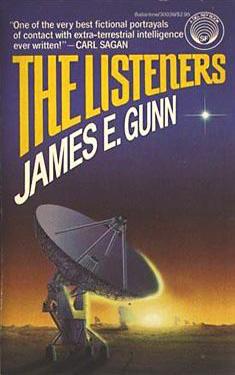 I haven’t been very adventurous in my reading for the Damon Knight Grand Master reading challenge. Seven of the ten books I’ve read so far have been by authors I have read other works of, while two others were acknowledged science fiction classics. For the eleventh read I decided to pick a book by someone I knew very little of. James Gunn doesn’t have as long a bibliography as some of his contemporaries and quite a lot is short fiction. He made quite an impact on the genre nevertheless. Besides writing, Gunn is a noted critic and teacher as well as the director of the Center for the Study of Science Fiction. The Listeners (1972) is a fix-up novel, various parts of it appeared in Galaxy Magazine and Fantasy and Science Fiction between 1968 and 1972. It is probably his best known novel, but apparently not one instantly recognized as a masterwork. Gunn missed out on all awards and nominations save one for the Campbell award in 1973. There have been a whole bunch of editions of this book with different forewords, introductions and afterwords. The copy I’ve read is a 2004 edition which features an introduction by H. Paul Shuch, an American physicist heavily involved with SETI, a foreword by Thomas Pierson, founder of the SETI Institute, and and afterword by the late Freeman J. Dyson, British-American mathematician and physicist. I guess this book is still well loved in scientific circles.
I haven’t been very adventurous in my reading for the Damon Knight Grand Master reading challenge. Seven of the ten books I’ve read so far have been by authors I have read other works of, while two others were acknowledged science fiction classics. For the eleventh read I decided to pick a book by someone I knew very little of. James Gunn doesn’t have as long a bibliography as some of his contemporaries and quite a lot is short fiction. He made quite an impact on the genre nevertheless. Besides writing, Gunn is a noted critic and teacher as well as the director of the Center for the Study of Science Fiction. The Listeners (1972) is a fix-up novel, various parts of it appeared in Galaxy Magazine and Fantasy and Science Fiction between 1968 and 1972. It is probably his best known novel, but apparently not one instantly recognized as a masterwork. Gunn missed out on all awards and nominations save one for the Campbell award in 1973. There have been a whole bunch of editions of this book with different forewords, introductions and afterwords. The copy I’ve read is a 2004 edition which features an introduction by H. Paul Shuch, an American physicist heavily involved with SETI, a foreword by Thomas Pierson, founder of the SETI Institute, and and afterword by the late Freeman J. Dyson, British-American mathematician and physicist. I guess this book is still well loved in scientific circles.
In 2028, the SETI’s search for extraterrestrial life is still ongoing without ever having picked up a single signal that indicates intelligent life. Director Robert McDonald, a staunch believer in the project, is facing ever more difficulties keeping SETI funded. McDonald himself is beginning to wonder if the project is worth the personal sacrifices he has to make. Then, a signal is received that is unmistakably of alien origin. A broadcast is received from a the direction of the star Capella, 45 light years distant. It changes everything. The project, the world, our place in the universe. Humanity is about to enter into a conversation with a ninety year time lag.



















 Full Details
Full Details
